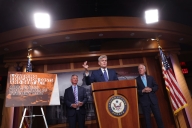You have /5 articles left.
Sign up for a free account or log in.
My daughter is at the age where she likes to hear stories about my childhood. “Tell me a story about little Aeron and little Deirdre,” she begs. They all begin in the same way: “Once upon a time, in a town called Buffalo, New York, there were two sisters…” I tell her about the Christmas when my father surprised me with grown-up platform shoes, when I barfed all over my sister after Thanksgiving, and of the mean tricks I played on friends. Anecdotes turn into fairy tales. I shorten and modify them to be entertaining but not frightening. I leave out divorce and spankings – foreign concepts to her. I’m charmed that she finds these stories interesting; I don’t suspect this will always be so. In part I tell these stories to make her grandfather real to her, a man she never knew.
My father was an electric, skilled storyteller. This fall his memoir will be published, posthumously. It chronicles his awakening into leftist politics, including his civil rights work, his anti war activism, and his years as a campus radical. It is also, to some extent, a personal memoir, describing his relationship to his family, losing his virginity, his divorce, and nervous breakdown. He had no plans to publish his memoir, but he did leave a loosely organized collection of essays and columns for his children as a record of his political legacy. Through a series of twists and turns, the book got into the hands of the University of Tennessee Press, and I was asked to edit it (along with Timothy Miller).
Editing a parent’s book is an odd (probably very Freudian) process. Initially, I wanted to refuse. After all, I had my own projects to work on, but the thought of anyone else taking charge was unbearable. Who else cared as much, who else had listened to his stories for 40 years?
So I found myself fact-checking my father’s memoir, asking my mother for help, and wishing I had paid better attention to some of his stories. I also tried to clean up his prose, and laughed when I realized that the original sentence was better, cleaner. I also ran the introduction by one of my dad’s sisters, who was seriously offended at the characterization of my father’s parents. I tried to be fair, but true to my father’s story. This is not always easy.
Although he taught for 30 years at S.U.N.Y. Buffalo, my father was not a scholar. One of his many questions to us was, “Would you rather write a book, or have a book written about you?” The answer was clear: live your life fully and don’t worry about making your mark; try to make a substantial contribution, and let someone else sweat away in a dusty bookshelf compiling footnotes. How ironic that my father’s life became a book and that person toiling on revisions ended up being me.
Perhaps because I saw the toll taken on devoting oneself to radical politics, I took a more traditional approach to my vocation. I majored in English, went to graduate school and got a PhD in Victorian literature, and then got a tenure-track job. Although my politics are not far from my father’s, I haven’t (yet) devoted my life to political activism. Instead, I read books and write about books. Yet my father was absurdly proud of my plodding accomplishments, my teaching, and my early efforts to find my own voice.
Next month my family will congregate in my hometown of Buffalo, NY (“The city of no illusions,” my father claimed to have penned) to celebrate the arrival of the book. I look forward, tremendously, to seeing some of my father’s friends, now cherished friends of mine. I will bring my daughter to my hometown for the first time, and introduce my husband to real chicken wings. We will all tell lots of stories.

